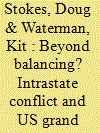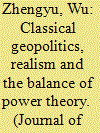| Srl | Item |
| 1 |
ID:
160638


|
|
|
|
|
| Summary/Abstract |
The rise of China has been fuelled by a massive military modernisation programme relying, in large part, on the acquisition of foreign military equipment. The question of how the world’s major powers define their arms transfer policies towards China is therefore crucially important. This article makes two original contributions. First, drawing on neoclassical realism, it proposes an explanatory framework integrating international and domestic factors to explain variations in major powers’ arms transfers. Second, based on a large body of elite interviews and diplomatic cables, it offers the first comprehensive comparison of American, British, French and Russian arms transfer policies towards China since the end of the Cold War.
|
|
|
|
|
|
|
|
|
|
|
|
|
|
|
|
| 2 |
ID:
160637


|
|
|
|
|
| Summary/Abstract |
Grand strategic theorists share an historical emphasis on interstate conflict, yet in contrast to the more frequent intrastate conflicts, these represent only 7 of the some 273 US military deployments since 1900. We argue that these intrastate conflicts limit the utility of regional balances of power in mitigating forms of conflict that the US may consider inimical to its national security interests. When considering potential changes to US force posture and grand strategy, American coercive statecraft should be theorised along a broader strategic continuum encompassing the full range of conflict.
|
|
|
|
|
|
|
|
|
|
|
|
|
|
|
|
| 3 |
ID:
160636


|
|
|
|
|
| Summary/Abstract |
Since the end of World War II, classical geopolitics as a particular form of realism has been disengaged from the development of mainstream realist theories. This disengagement has not only concealed the value of classical geopolitics as a framework of analysis for policy and strategy, but also created an increasing rift between theory and policy in contemporary realist theories. This paper seeks to reengage classical geopolitics with mainstream realist theories by clarifying its realist traits and analytical characteristics, (re)stating its core propositions and probing into its potential contribution to the development of mainstream realist theories. This paper contends that classical geopolitics, while having a distinctive pedigree, can arguably be considered an integral part of the family of realist theories in view of its basic theoretical assumptions concerning international anarchy, the unit of analysis and power politics. As a framework of analysis, classical geopolitics incorporates three interrelated strategic propositions. Those three propositions not only constitute the theoretical core of classical geopolitics, but also manifest a peculiar balance-of-power conception that is essentially distinct from those proposed by mainstream realist theories. This paper argues that those three propositions combined promise to fill in prominent lacuna in the balance-of-power research programme, and also have significant implications for contemporary world politics.
|
|
|
|
|
|
|
|
|
|
|
|
|
|
|
|
| 4 |
ID:
160639


|
|
|
|
|
| Summary/Abstract |
The beginning of the twenty-first century has witnessed the emergence of balancing responses to the US hegemony, among which Russia’s foreign policies stand out as corresponding to what is understood as ‘hard balancing.’ Why is the United States being balanced against? This paper categorizes the existing theories of non-balancing into six conditions that together guarantee the absence of balancing and demonstrates that the current unipolar system can satisfy only one of them. This eases the systemic constraints and makes balancing possible. The paper then presents three cases of balancing with reference to President Putin’s foreign policy. It argues that even though in terms of relative military capabilities unipolarity still holds, the emergence of counter-hegemonic balancing is indicative of important changes in the nature of post-Cold War American domination.
|
|
|
|
|
|
|
|
|
|
|
|
|
|
|
|